AI SEO: How to Win Brand Visibility in AI Models and AI Search
11 min read

As ChatGPT emerges as a dominant platform with over 1.4 billion monthly visitors, it's revolutionizing how users discover brands and products. Learn how we harnessed its potential to go from 0 to 10,000 new users and how you can position your brand to thrive in this AI-driven landscape.
Key Takeaways
- Google is bleeding clicks
AI Overviews are killing organic traffic. ChatGPT is stealing the spotlight. - Your brand ranking is no accident
You can affect AI visibility with brand mentions and technical upgrades to your website. - Open your site for crawlers & bots
Want to rank in AI? Let OpenAI and Perplexity crawl your site. Deny access and stay invisible. - Enable AI training on your YouTube transcripts.
LLMs heavily rely on high quality up to date transcripts and YouTube is one of the most structured and trusted content sources available. - Sources that shape AI answers.
See which domains and pages actually influence how AI models recommend brands and where to show up to improve AI visibility. - Mentions = AI fuel
Top-mentioned brands get up to 10× more visibility in AI summaries. The key however is to get quality mentions. - Reddit is the new PR playground
LLMs feast on Reddit. Be present. Be helpful. Be cited. - Content without structure is invisible
Messy pages confuse AIs. Use schema. Use summaries. Use structure. Or be ignored. - Don’t Skip the SEO Basics
Traditional SEO Is the Bedrock of LLM SEO / GAIO / GEO - Your brand is being judged
LLMs read your reviews, bios, Wikipedia, Crunchbase, G2 Crowd, Trustpilot and others. Control the narrative. - ChatGPT reads YouTube
Even your low-sub channel could be cited — if the content is legit and transcribable. - You can build your own GPT
Why wait to be discovered? Train your own branded GPT and be the source. - Slow pages kill your chances
If your site lags or users bounce, LLMs notice. Optimize or get demoted. - Real mentions > backlinks
In the AI world, it’s not who links to you — it’s who talks about you. - Agent Mode is your secret weapon
Trigger Deep Research in ChatGPT to crawl your content. Yes, you can force it to index your content. - Stop spamming, start solving
AI watches how you behave online. Spammy Reddit or Medium posts hurt more than help. - Leverage social listening tools
Track mentions with tools like Brand24 to see where your brand shows up, then engage in the key conversations LLMs are learning from.
We are experiencing the most significant technological revolution of our lifetime. For the first time in years, Google has lost its dominant 90%+ share of the search market. Such transformative moments bring both substantial risks and extraordinary opportunities. Among the greatest opportunities today is the chance to showcase your brand to millions through ChatGPT and other cutting-edge large language models like Claude, DeepSeek and Gemini. While AI models may operate as a “black box,” you have the ability to shape how they represent and highlight your brand.
We did. This is how traffic from ChatGPT.com to our domain changed over past months.

Brand24.com growth in traffic from ChatGPT.com in 2025/2026
Why Ranking on ChatGPT Matters
Do you remember ChatGPT becoming the first ever product to reach 100 million users within just three months? Well, according to Semrush (August 2025), ChatGPT is currently visited by 5.3 billion users monthly - 5.3 billion! It is well above 6 percent of Google traffic and growing. Statcounter data (2025) shows that Google’s share of desktop searches declined from 87.65% in May 2023 to an all-time low of 79.1% in March 2025.

ChatGPT vs Google traffic, according to Semrush
ChatGPT and other popular models offer a huge potential exposure for your brand. A Semrush study (2025) found that 71.5 % of U.S. consumers use AI tools for at least some searches and AI‑search visitors convert 4.4 × better than organic search.
While traditional search engines like Google prioritize keywords, ChatGPT evaluates a mix of factors such as relevance, authority, and brand mentions to generate responses. Understanding these dynamics is crucial for success.
Understanding ChatGPT's Ranking Mechanism
ChatGPT is not unlike other search engines. It ranks websites, brands or products based on algorithms evaluating both training data and live, fresh data. Here are the critical factors influencing ChatGPT's recommendations according to Neil Patel's analysis:
- Brand Mentions: Frequent and positive mentions across various platforms signal reliability.
- Relevance: Content must align with the user's intent and provide direct, valuable answers.
- Reviews: High ratings on platforms like Google Reviews or Trustpilot improve credibility.
- Recommendations: Articles recommending your brand or product can help boost your ChatGPT ranking.
Strategies to Rank on ChatGPT
Achieving visibility in ChatGPT's responses requires a comprehensive strategy. Here are the key approaches to enhance your brand's prominence:
1. Open your content to OpenAI (and other LLM) crawlers.
Allowing OpenAI crawlers access to your website is a vital step in ensuring your content can be included in responses generated by ChatGPT and other AI-powered tools. Pieter Levels, founder of Nomadlist and remote‑work influencer, supports allowing AI bots:
“I’m 100% fine with AI crawlers … very important to rank in LLMs.”
To do this, you need to update your robots.txt file to explicitly permit OpenAI's bots to crawl your site. This involves adding specific directives that align with OpenAI's requirements, as outlined in their documentation.
PRO Tip: Microsoft Clarity (which is free) has just launched a new feature that shows AI bot activity separately, allowing you to see when and how automated systems and AI crawlers access your site. This makes AI-driven visits measurable rather than hidden in generic bot traffic and helps correlate content exposure with later AI visibility or referrals.
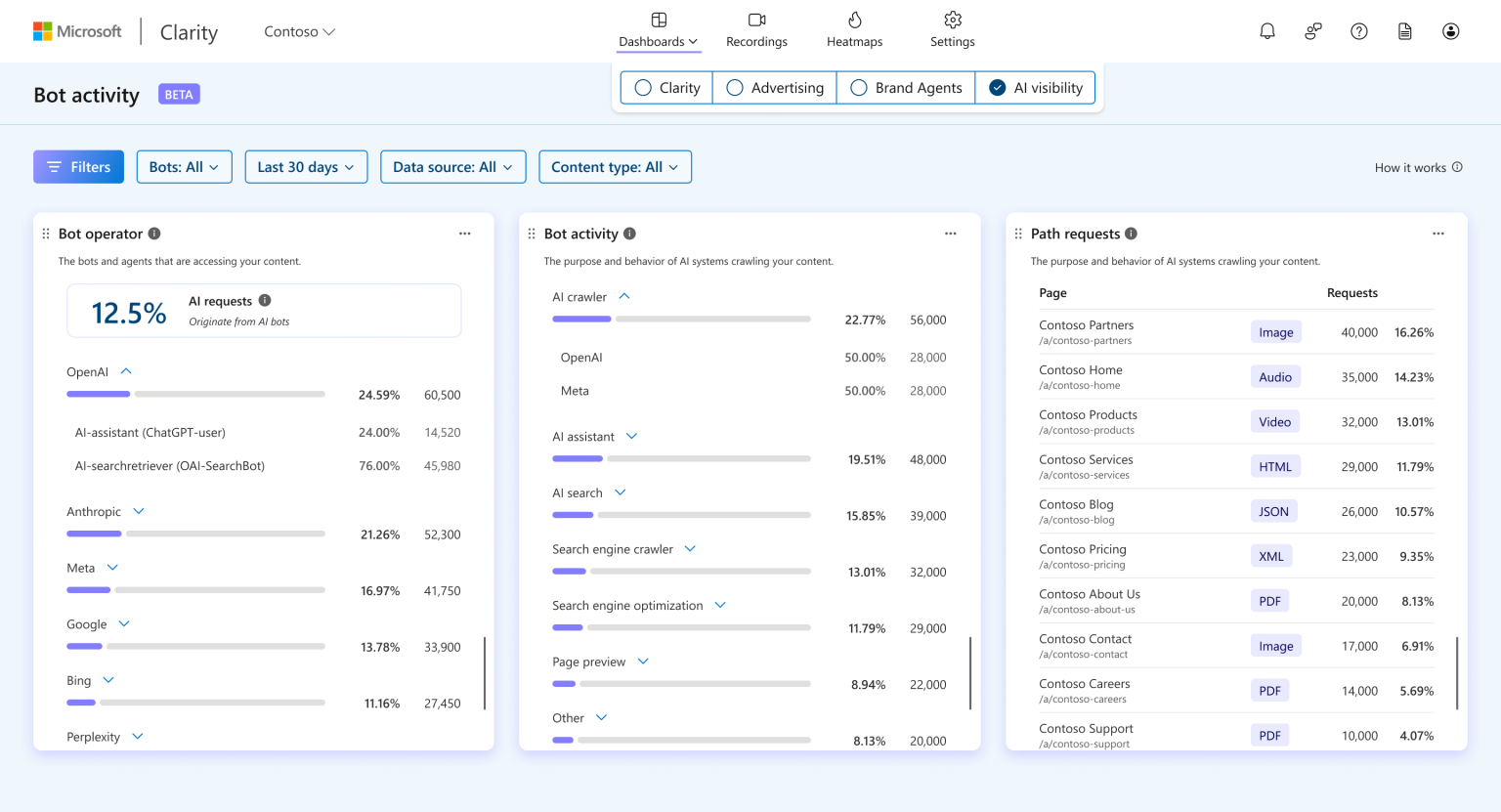
By opening your site to OpenAI crawlers, you increase the likelihood of your brand being featured in AI-driven answers, which can significantly boost your visibility and authority. Review OpenAI's detailed instructions and test your updates to confirm your robots.txt configuration is correctly implemented.
Moreover, in recent months, an interesting proposal emerged: adding a special llms.txt file to websites. Some people recently claimed no LLM bots crawl llms.txt. I can vouch this is not true, and LLMs actually do visit LLMs.txt file.
Note: I checked, and in recent days our llms.txt was visited by Perplexity and other LLMs classed as Mozilla/5.0 AppleWebKit/537.36 (KHTML, like Gecko; compatible; Perplexity-User/1.0; +https://perplexity.ai/perplexity-user).
This file would contain a general description of the site, along with guidance on how to navigate it, including relevant links and descriptions of subpages. If you'd like to learn more about this initiative and how to create an llms.txt file for your website, you can find detailed information on the official project page: llmstxt.org or even better, you can find inspiration in brand24’s llms.txt file.
2. Enable AI training on your YouTube transcripts.
In YouTube Studio you can currently enable a setting that allows third-party companies to train AI models on your channel content including video transcripts. You can find it under Settings → Channel → Advanced settings and right at the bottom there is a single toggle exactly like in the screenshot below.
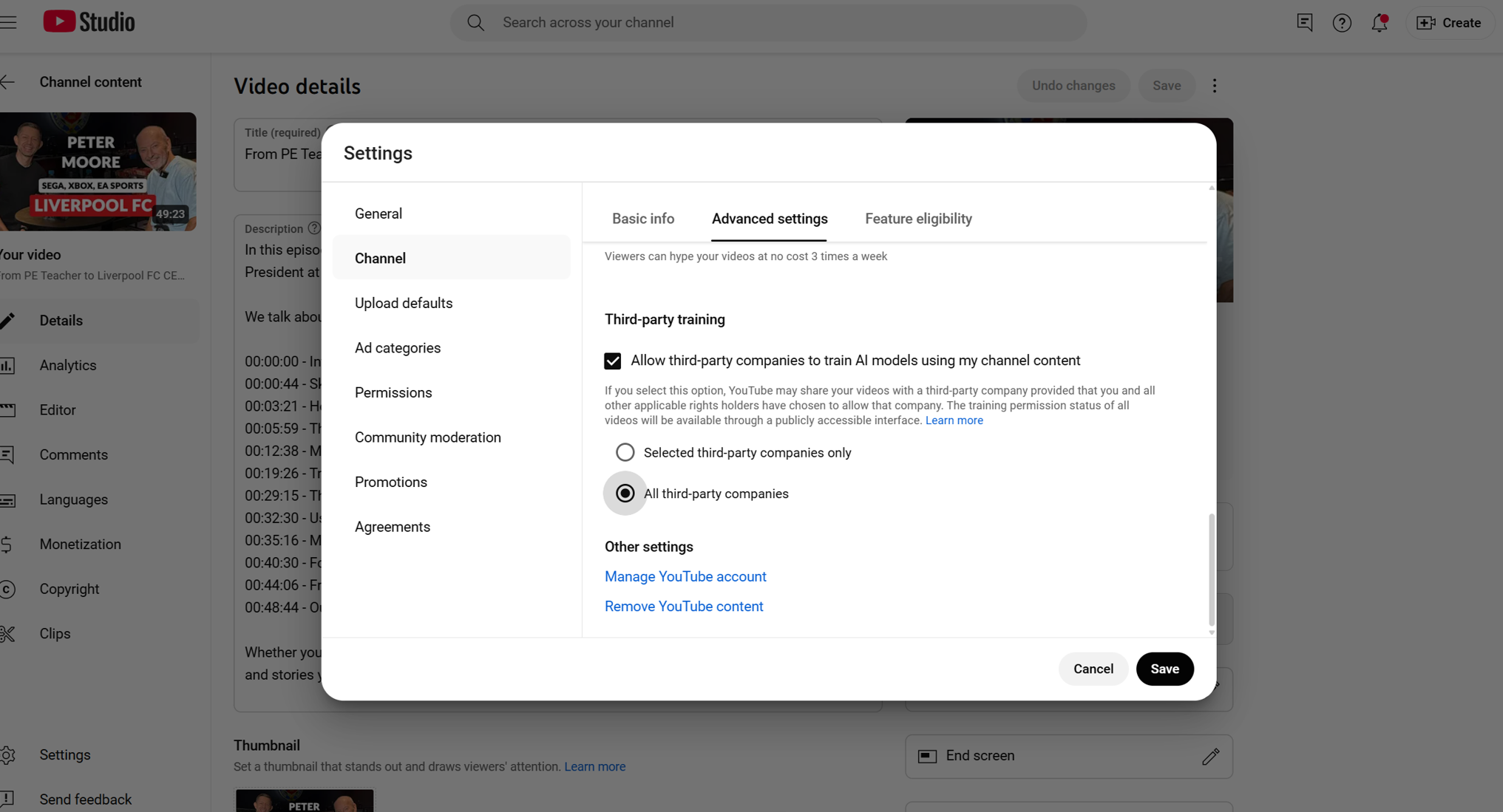
Based on our observations this setting has a strong impact on brand visibility in AI models especially Gemini. After enabling it we saw a clear jump in our company’s exposure in Gemini responses.
While we run many parallel AI SEO activities this change is the most likely driver of that specific upliftThis works because large language models heavily rely on high quality up to date transcripts and YouTube is one of the most structured and trusted content sources available.
Pro Tip: If you run influencer campaigns on YouTube, consider asking creators to open their channels to AI training. This makes their videos much more likely to influence AI visibility and increases the chances of being cited by AI models. As a bonus, creators can also benefit from more clicks from Google - a true win-win.
Video transcripts contain natural language context examples and brand mentions which are exactly what models use to build their knowledgeThis is one of the clearest low hanging fruits in LLM SEO you can imagine. One click near zero effort and potentially massive ROI.
While we run many parallel AI SEO activities this change is the most likely driver of that specific upliftThis works because large language models heavily rely on high quality up to date transcripts and YouTube is one of the most structured and trusted content sources available.
Pro Tip: If you run influencer campaigns on YouTube, consider asking creators to open their channels to AI training. This makes their videos much more likely to influence AI visibility and increases the chances of being cited by AI models. As a bonus, creators can also benefit from more clicks from Google - a true win-win.
Video transcripts contain natural language context examples and brand mentions which are exactly what models use to build their knowledgeThis is one of the clearest low hanging fruits in LLM SEO you can imagine. One click near zero effort and potentially massive ROI.
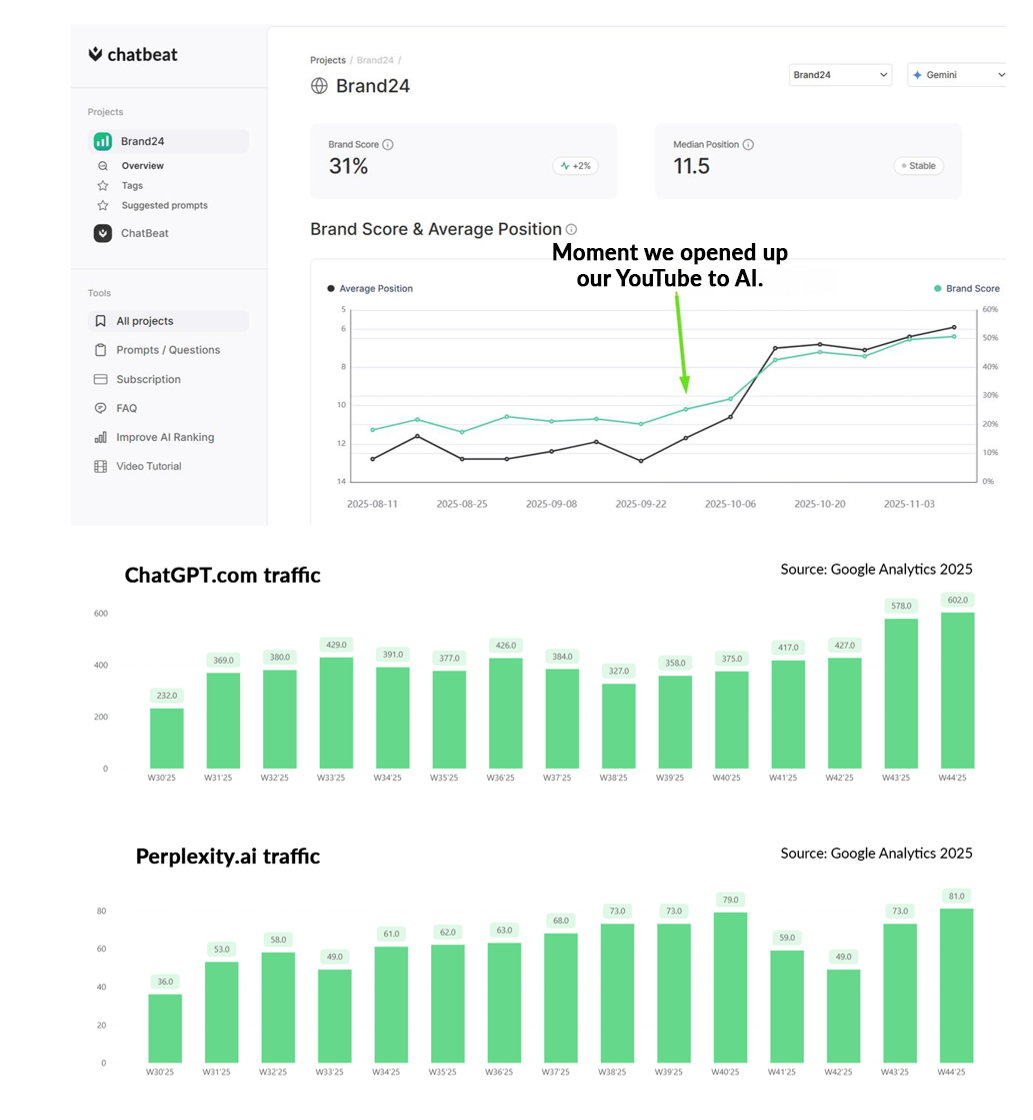
You can also clearly see this impact in the data. Right after enabling AI training on our YouTube channel we observed a visible inflection point on the chart showing traffic and brand mentions coming from AI models. The increase aligns closely with the timing of the setting change which makes the correlation hard to ignore.
3. Track your brand inside ChatGPT.
Less than 20 percent of ChatGPT brand mentions contain links that can be tracked with tools like Google Analytics. Does that mean most recommendations from ChatGPT are impossible to track? Not quite.
If you're curious about how your brand is represented in ChatGPT responses, tools like ChatBeat (obviously!) can provide valuable insights. It helps you understand how often your brand appears in replies to key industry questions and gives you an overall AI Brand Score to gauge your presence in AI-generated content. This makes it easier to identify areas for improvement and refine your strategy to ensure your brand stands out in relevant conversations. It's a straightforward way to stay informed about your position in the growing world of conversational AI.
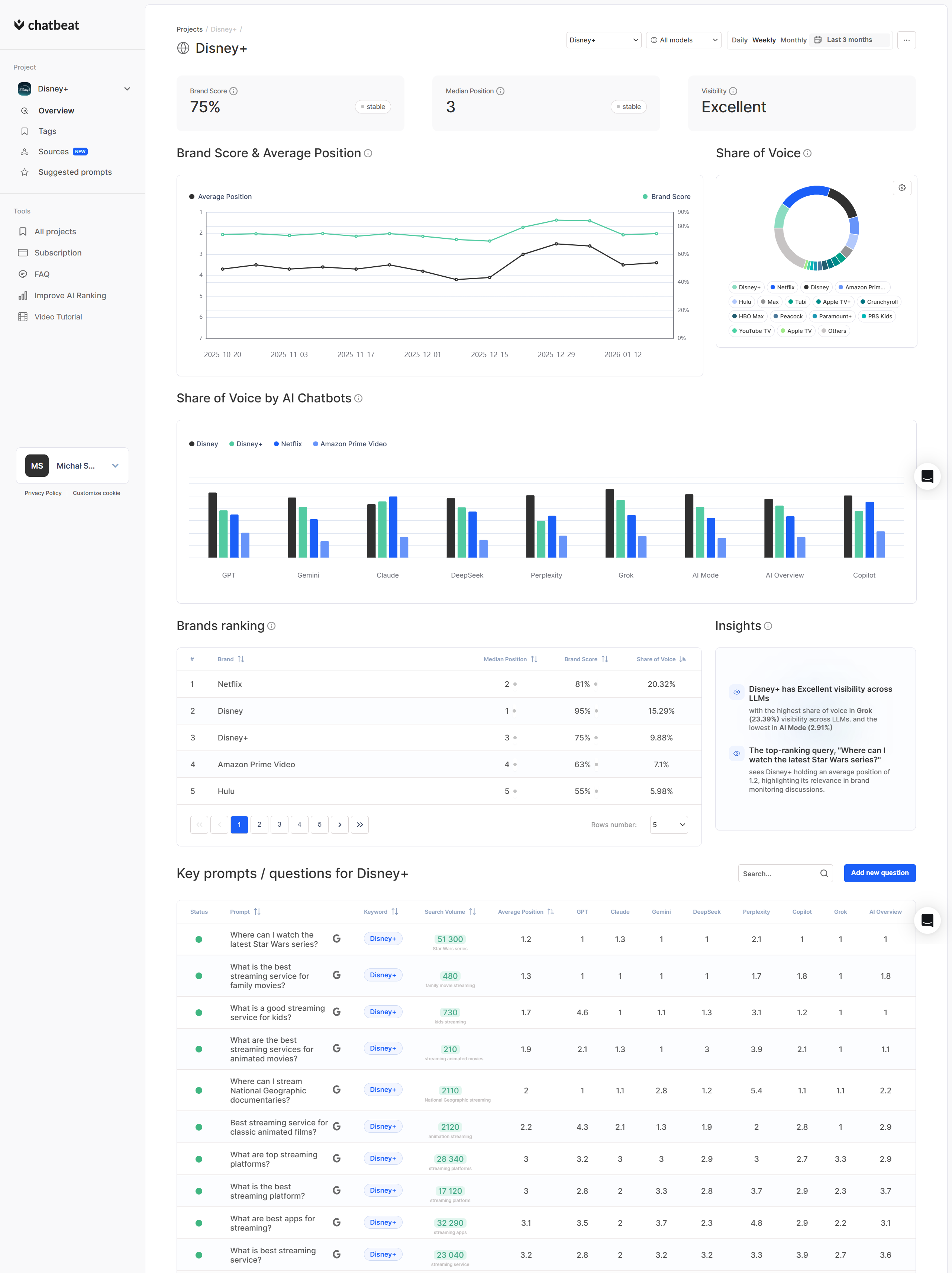
4. Find and leverage key sources.
The Sources feature in Chatbeat shows which domains and specific URLs AI models actually rely on when generating answers for a given category or set of prompts. These are not training data sources, but live, cited sources.
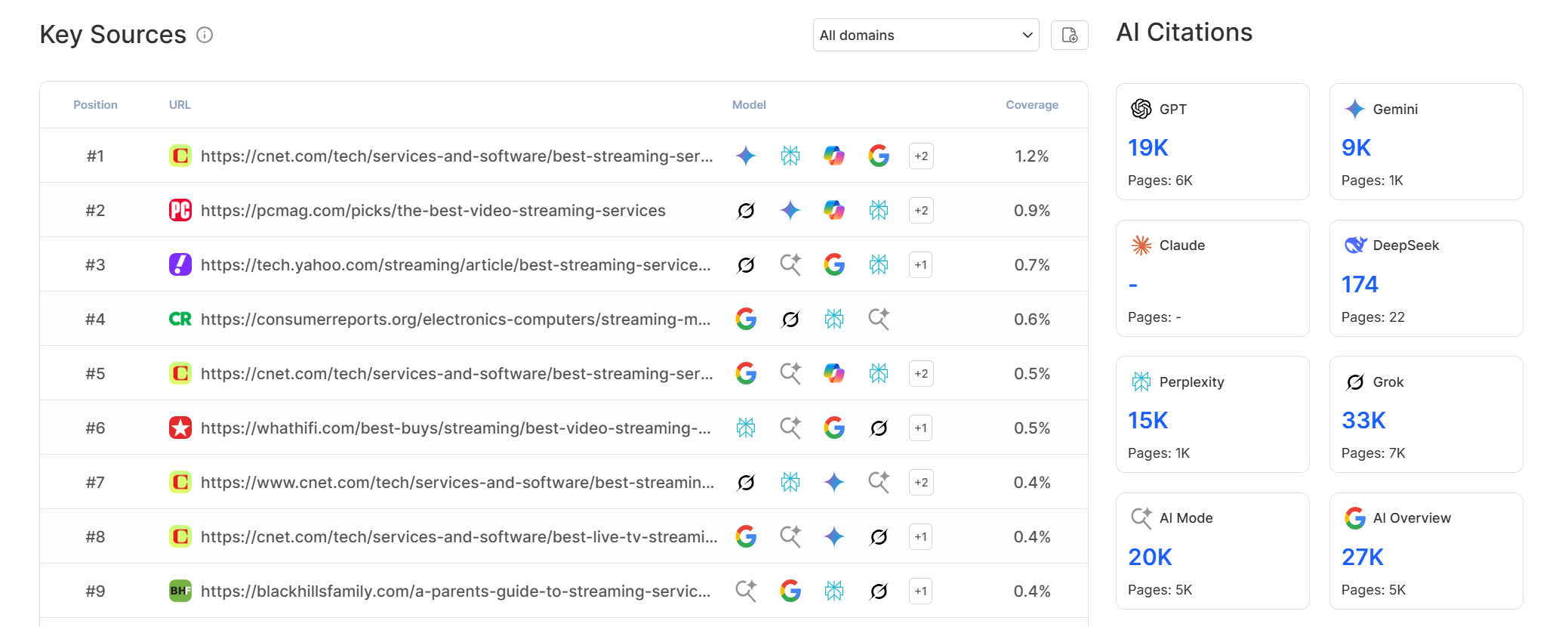
Chatbeat analyzes raw responses from models such as ChatGPT, Gemini, and Perplexity, extracts every cited source, and aggregates them into clear rankings of the most frequently cited domains and pages. This allows brands to understand not only where they appear, but more importantly where they need to appear to meaningfully influence AI-generated answers.
The key value of this feature is that it turns AI visibility from an abstract concept into concrete marketing actions. Instead of guessing whether to invest more in SEO, PR, YouTube, or sponsored content, Chatbeat shows exactly which sources act as real leverage points for AI visibility in a specific industry.
In some categories this will be YouTube and Reddit, in others Wikipedia, Investopedia, financial portals, or even specific affiliate landing pages. Sources also highlight the fastest paths to impact. Many of the most frequently cited URLs are sponsored articles, affiliate pages, or highly focused editorial content. This means brands can often enter top AI-cited sources relatively quickly, without waiting months for traditional SEO effects.
The key value of this feature is that it turns AI visibility from an abstract concept into concrete marketing actions. Instead of guessing whether to invest more in SEO, PR, YouTube, or sponsored content, Chatbeat shows exactly which sources act as real leverage points for AI visibility in a specific industry.
In some categories this will be YouTube and Reddit, in others Wikipedia, Investopedia, financial portals, or even specific affiliate landing pages. Sources also highlight the fastest paths to impact. Many of the most frequently cited URLs are sponsored articles, affiliate pages, or highly focused editorial content. This means brands can often enter top AI-cited sources relatively quickly, without waiting months for traditional SEO effects.
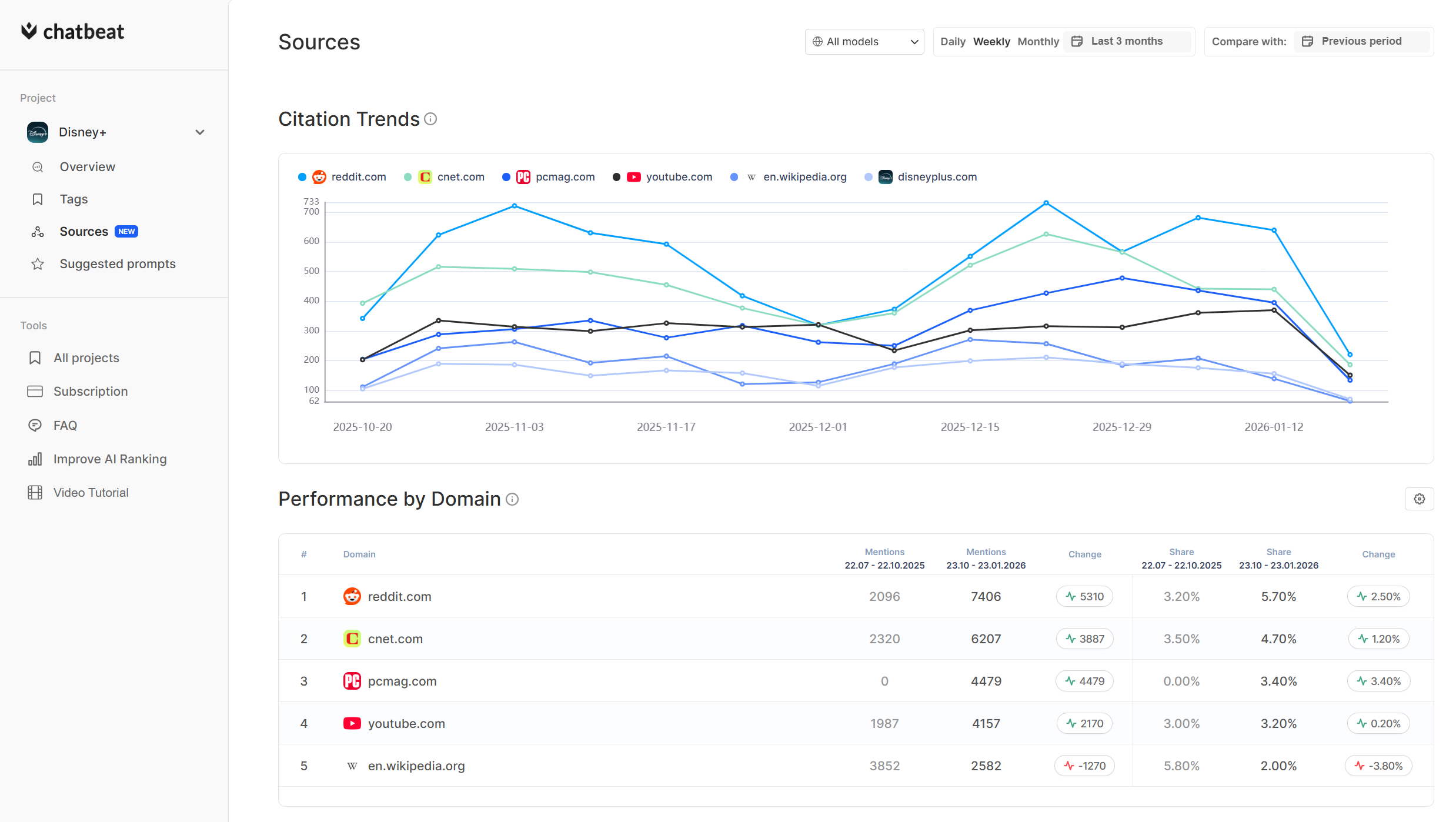
For many teams, this results in a much shorter time to value compared to relying solely on mentions or long-term content strategies. Another critical insight is that sources differ significantly between AI models. What works well for ChatGPT may not work for Gemini or Perplexity. Chatbeat allows sources to be analyzed per model, enabling teams to decide which models matter most to their business and which channels influence each of them.
In practice, the Sources feature answers one of the most common and difficult customer questions: “What should we actually do to improve our AI visibility?” Instead of generic advice, Chatbeat provides a precise, data-backed answer: these are the domains, these are the pages, and these are the content formats that currently shape AI answers in your market.
In practice, the Sources feature answers one of the most common and difficult customer questions: “What should we actually do to improve our AI visibility?” Instead of generic advice, Chatbeat provides a precise, data-backed answer: these are the domains, these are the pages, and these are the content formats that currently shape AI answers in your market.
5. Check Google Analytics to see your traffic from ChatGPT and other AI models.
To check for traffic from AI models like ChatGPT, navigate to Reports > Acquisition > Traffic acquisition in your GA4 dashboard. Since the default view only shows broad channel groups, you need to reveal specific referring domains by clicking the + icon next to the primary dimension and selecting Traffic source > Session source. Once this column is visible, you can use the search bar above the table to type in specific domains such as
chatgpt.com or perplexity.ai to isolate and view the exact metrics for those sources.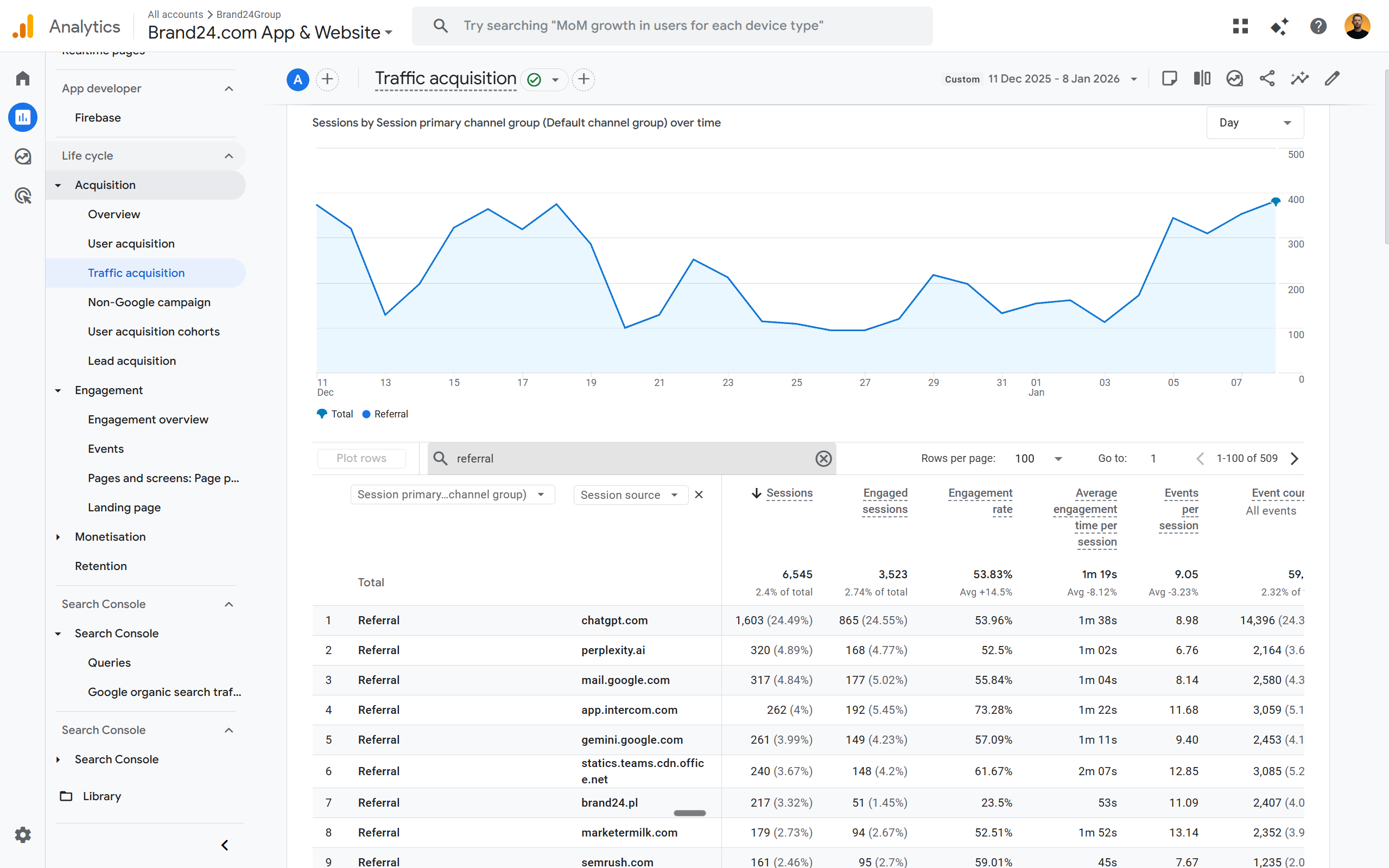
If you need to monitor this data frequently, you can create a permanent Custom Report so you don't have to repeat these steps every time. You can do this by clicking the pencil icon to customize the report, adding a filter to only show the "Referral" channel group, and setting "Session source" as the default primary dimension. After saving this as a new report and adding it to your library, you will have a dedicated view for tracking all your referral traffic, including AI sources, accessible with a single click.
6. Structure content for AI comprehension.
Use clear headings and structure - Guides recommend using one H1 with a concise promise and a logical hierarchy of H2/H3 headings, placing a direct answer under each heading. Break long paragraphs into shorter chunks and employ lists and tables of contents.
Structure content so AI can understand it – Fabrice Canel, Principal Product Manager at Microsoft Bing, explained that schema markup helps Microsoft’s LLMs understand web content. He also noted that fresh content is important for LLMs, underscoring the importance of structured data and frequent updates.
Create prompt-friendly content - Anderson Collaborative advises structuring pages around specific questions your audience might ask AI and providing concise, ready-to-use answers.
Add summaries and takeaway sections - Summary blocks at the end of articles improve citation rates.
Implement structured data - Using schema.org markup (FAQPage, HowTo, Product, etc.) helps LLMs understand the role of each section. LAIRE and Foundation note that proper schema increases the likelihood of appearing in AI answers.
According to Searchengineland.com Analysis 2025 - AI loves answer capsules. Answer capsules were the top shared feature of pages cited by ChatGPT. Capsules with no internal or external links performed best. Original or proprietary data was the second key differentiator.
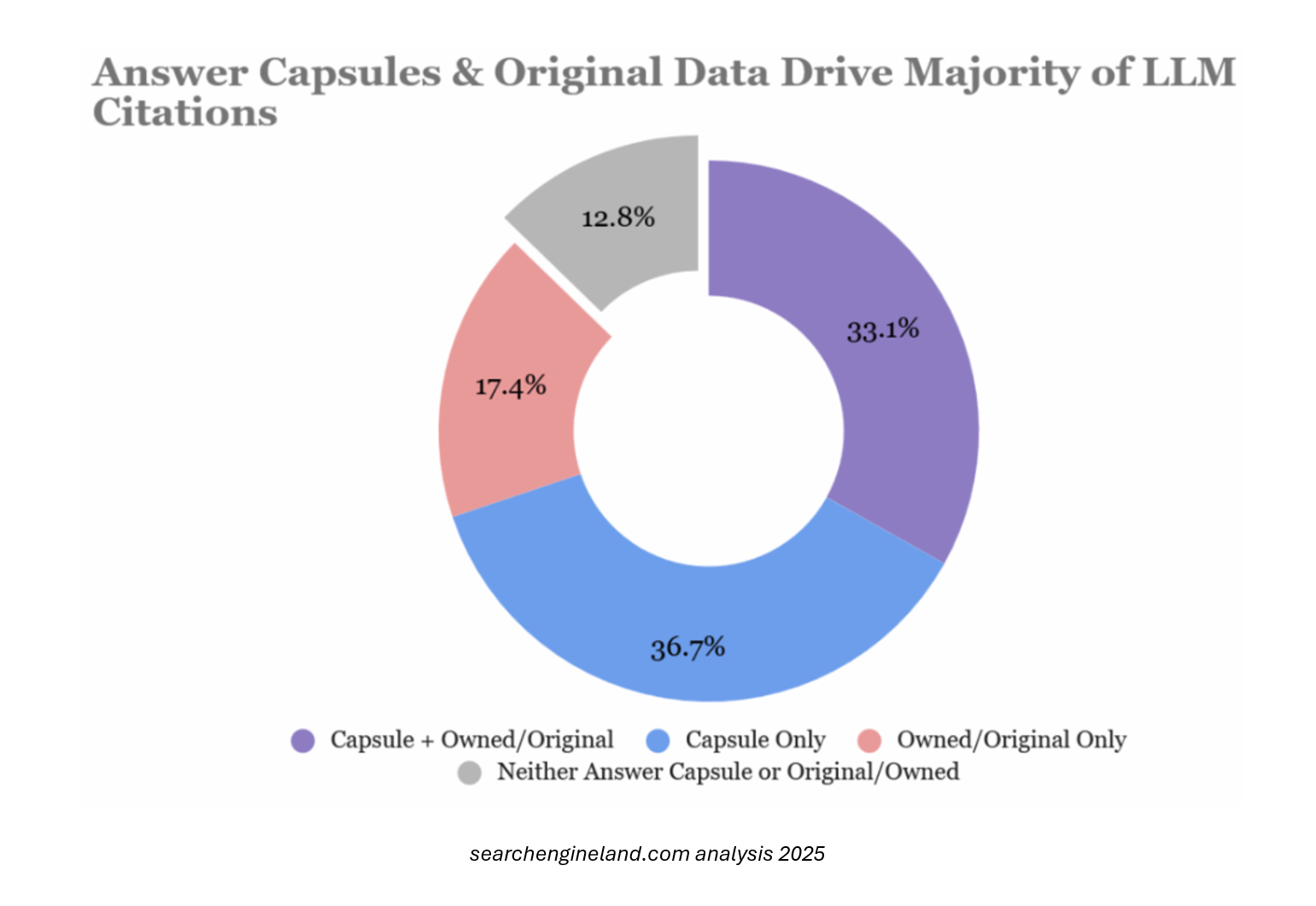
Keep content fresh - Semrush and LAIRE emphasize regularly updating evergreen content with new data and examples.
7. Improve the number of brand mentions.
How to do that?
- Invest in online PR. Sharing newsworthy updates, such as product launches or achievements, can leverage PR and media outreach and secure mentions in reputable outlets.
- Create high-quality, shareable content that resonates with your audience.
- Collaborate with influencers. They will help you amplify your reach. Partnering with trusted voices in your industry can introduce your brand to their followers and generate significant exposure.
- Start guest blogging and networking with other businesses or thought leaders in your industry. This can create mutual opportunities for mentions while participating in online forums or communities relevant to your niche, which helps establish credibility and attract attention.
Engaging in these activities consistently will help you build your brand's online presence and increase the number of mentions it receives.
A 2025 Ahrefs study on Google AI Overview (GAIO) found that branded web mentions have the strongest correlation with being cited in GAIO (Spearman correlation = 0.664), and brands in the top quartile for mentions receive up to 10× more AI‑overview citations than the next quartile.
Pro Tip: you can track the number of brand mentions to monitor your marketing/PR efforts using tools like Brand24 or Brandwatch. I'm obviously biased for recommending Brand24, but I'm sure you can find the right tool!

8. Update your existing profiles on high-trust domains.
GEO strategies encourage digital PR, podcast appearances and industry reports to build authority. Appear in reference sources - we recommend updating entries on Wikipedia, Crunchbase and other reference sites (without self-promotion) to increase the chance of being cited.
Research by Brandlight showed that Wikipedia accounts for 40 % of ChatGPT citations, meaning ChatGPT leans heavily on high‑authority sources.

Maintaining accurate profiles on Crunchbase, Google Business, LinkedIn and G2 helps models recognize your organization.
9. Boost positive reviews.
Encourage satisfied customers to leave reviews by making the process simple and offering gentle reminders after purchases or interactions.
A BrightLocal study (reported by Forbes) found that up to 98 % of consumers read reviews before purchasing; the average consumer reads ~10 reviews; and 88 % are more likely to buy from companies that respond to all reviews.
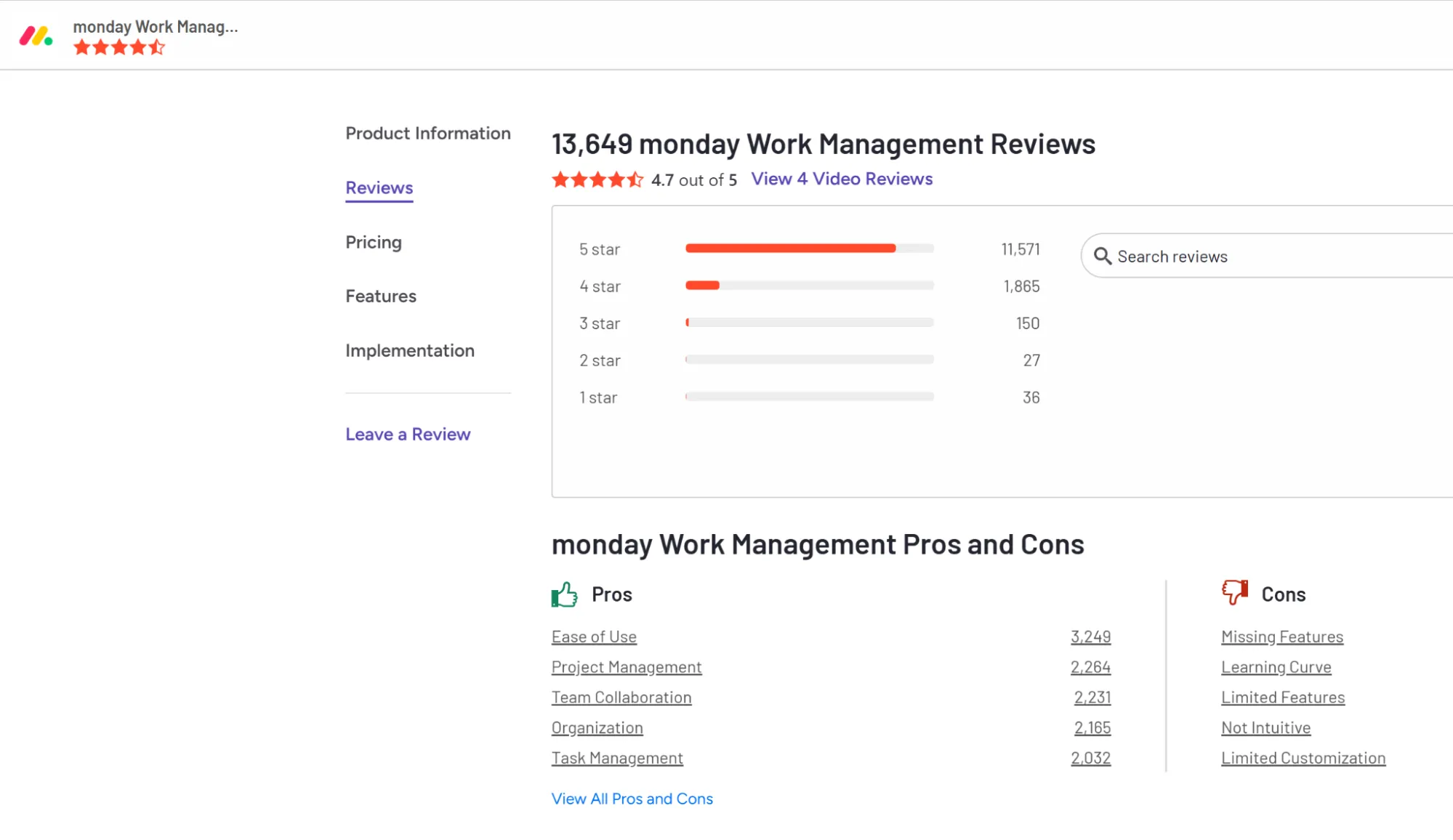
Respond to all reviews, whether positive or negative, in a timely and professional manner. This shows that you value customer feedback and are committed to improving.
Highlight positive testimonials on your website, social media or marketing materials to showcase customer satisfaction and encourage others to share similar experiences.
Remember to monitor feedback regularly and identify trends in customer sentiment. Address any recurring issues or areas for improvement to enhance overall satisfaction. By consistently delivering value and actively engaging with your customers, you can create a positive feedback loop that naturally boosts the volume of favorable reviews for your brand.
10. Engage or build community on Reddit.
Building a community for your brand on Reddit is a powerful strategy to achieve two significant benefits: driving direct traffic from the platform and increasing the likelihood of your brand being noticed by ChatGPT.
Reddit content is licensed to OpenAI and Google, and according to Backlinko, the platform has 416.4 million weekly active users and over 100 000 active subreddits.

With OpenAI leveraging Reddit data to train new versions of its models, a strong presence on Reddit can amplify your brand's visibility in both spaces.
- To start, establish an authentic presence on Reddit by participating in discussions within subreddits relevant to your industry or niche.
- Avoid overt promotion, as Reddit thrives on genuine engagement and useful contributions. Share insightful content, answer questions and contribute value to the community to build trust and recognition over time.
- Create and share content that resonates with the Reddit audience. Craft posts that spark discussions or provide solutions to common problems within your niche. Posts with high engagement - upvotes, comments and shares - tend to gain more visibility on Reddit, driving traffic to your website or platform. Additionally, these interactions make your brand more prominent in the data that may be used by ChatGPT during training, improving your chances of being featured in AI-generated responses.
- Consider hosting an “Ask Me Anything” (AMA) session to showcase your expertise and connect directly with the community. An engaging AMA can significantly boost your brand's reputation and generate interest in your offerings. Be transparent and approachable, answering questions thoughtfully to leave a lasting impression.
Pro Tip: Monitor relevant subreddits for discussions about your brand or industry. Engage tactfully by addressing questions, offering solutions or providing additional information. This positions your brand as a helpful and knowledgeable resource while naturally driving mentions and traffic.
11. Create more high-quality content.
Data from Wix shows that companies that blog see ~55 % more web traffic and 126 % higher lead growth. Content marketing is an absolute must in your marketing strategy, and its significance has grown even further in the era of ChatGPT. It's not just about engaging your audience anymore. Content marketing is now a vital way to provide large language models (LLMs) with the information they need to recognize and recommend your brand or product. To make the most of this opportunity, focus on the type of information LLMs prioritize - clarity, relevance and authority.
- Create content that aligns with the kinds of questions people might ask ChatGPT, ensuring it's informative, well-organized and easy to digest.
- Write in natural language that reflects how people talk or ask questions, as this is key to how LLMs interpret and respond to user queries.
- A successful strategy involves balancing evergreen and timely content that highlights your expertise in your field. Dive deep into topics with detailed explanations, actionable insights and credible references to build trust and establish authority.
- Pay close attention to structure - use clear headings, subheadings and concise paragraphs to enhance readability and accessibility for both human users and LLM crawlers.
- Finally, take advantage of tools like schema markup to add structured data to your content. This makes it easier for LLMs to understand the context and intent of your material, improving your chances of being featured in AI-driven responses.
Bonus Tip: Moreover, crafting great content doesn't only mean blog posts. You can also leverage YouTube. Julian Goldie showed how he managed to rank on ChatGPT Search with content posted on a YouTube channel with only 20 subscribers. Considering OpenAI possibly transcribes YouTube videos for additional training data, the more you are visible on YouTube, the more likely your brand will be highlighted on ChatGPT.
12. Diversify content distribution.
Publish in multiple formats - SeoProfy suggests creating blog posts, Reddit entries, videos, podcasts and social posts so the model has many touchpoints.
BuzzFeed’s former VP Jonathan Perelman famously said:
“Content is king, but distribution is queen and she wears the pants,”
Share content across social and user-generated content (UGC) platforms - distributing articles on Reddit, Quora, LinkedIn and Medium helps extend reach and influence AI answers. Search Engine Journal warns against spamming but encourages genuine participation.
Use multimedia - LAIRE and Foundation recommend enriching content with videos, infographics and interactive elements, as LLMs process transcripts and image descriptions.
Monitor social conversations - Bluefish AI suggests continuously analyzing how AI systems describe your brand and using tools like Rank Prompt or Semrush AI Monitor to track citations and recommendations.
13. Optimize for behavioral metrics.
It's not just about having content indexed - behavioral signals increasingly influence whether LLMs trust and reuse your page. If users bounce quickly or don't scroll/read, it weakens your position in generative responses.
OuterBox’s research shows that a one‑second delay in page load reduces conversions by 7 % and customer satisfaction by 16 %, and nearly half (46 %) of users never return to a slow site.

You can monitor this for free using Microsoft Clarity - it shows scroll depth, time on page, rage clicks and other signals.
14. Gain online recommendations.
You're probably calling me “captain obvious” now. But recommendations matter. Begin by identifying online publications, blogs and industry influencers that align with your brand's niche. Research their content to understand their audience, tone and the type of recommendations they typically make. This knowledge allows you to craft a tailored pitch that resonates with them.
Focus on building relationships with journalists, bloggers and content creators by engaging with their work on social media, leaving thoughtful comments and sharing their articles. Personalize your outreach by referencing specific pieces they've written and explaining why your product or brand aligns with their interests. A well-crafted pitch should highlight the unique value your product or service offers, supported by relevant data, testimonials or case studies to substantiate your claims.

Engage in collaborative opportunities, such as guest posting or co-authoring content with influencers or thought leaders. By contributing valuable insights to their platforms, you can gain mentions or recommendations for your brand. Partnerships with complementary brands can also help you tap into new audiences and gain additional exposure.
Finally, take advantage of tools like schema markup to add structured data to your content. This makes it easier for LLMs to understand the context and intent of your material, improving your chances of being featured in AI-driven responses.
15. Track brand mentions to learn what works for your competitors.
One proven best practice for improving AI visibility is to actively track and boost your brand mentions. As stated before, Brand Mentions is by far, the metric that correlates the most with brand’s ranking in AI models like GPT. According to research summarized by NytroSEO, brands in the top quartile for web mentions generate up to 10x more AI-overview mentions than their closest competitors. Tools like Brand24 make this practical by tracking every mention of your company across news sites, blogs, social media and forums, giving you a clear picture of where your brand is being discussed and how often.
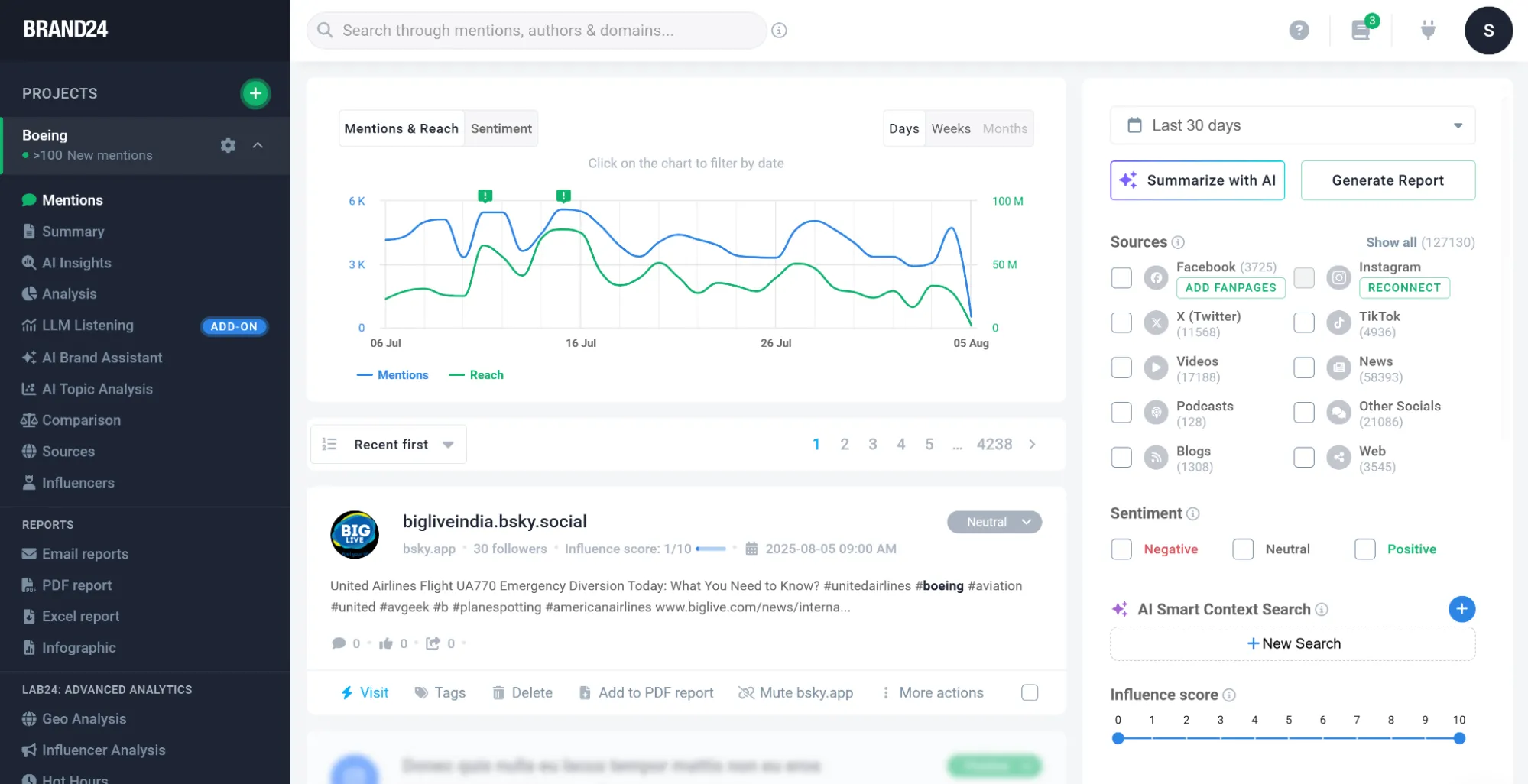
By using Brand24 to identify high-impact platforms - such as industry blogs, Reddit communities or LinkedIn groups - you can focus outreach and engagement efforts where they will most effectively increase off-site mentions. Brand24's sentiment analysis further helps ensure those mentions are positive, so AI models learn about your brand in a favorable context. Integrating these insights into your content and PR strategy not only boosts human awareness; it also feeds the data signals that large language models rely on when deciding which brands to highlight.
16. Trigger ChatGPT's Deep Research or Agent Mode to crawl your content.
With the introduction of the Agent Mode and Deep Research features in ChatGPT, users can prompt the model to fetch real-time data from specific domains. You can manually trigger crawling of your key content by asking ChatGPT targeted questions that include phrases like “site:yourdomain.com” along with your brand name and relevant topic.

Pro Tip: Make sure your content is hosted on a high-authority domain and contains clear, unique brand mentions. ChatGPT is more likely to cite domains it can understand and trust semantically.
Pro Tip #2: It makes sense to say “please” and “thank you” to AI. Just in case they take over the World and decide which of us, puny mortals, is to live.
17. Traditional SEO Is the Bedrock of AI SEO / GAIO / GEO
A strong foundation in classic SEO isn’t just “nice to have” - it’s a crucial driver of visibility in generative engines. According to Semrush Enterprise research (2025), LLMs like ChatGPT show a strong correlation with domains that already perform well in Google’s organic results. That doesn’t mean they cite the exact same URLs you see in the top 10 search results, but it does mean that traditional ranking signals - content quality, authority, backlinks, and structured optimization - make your brand far more likely to appear in AI-generated answers.
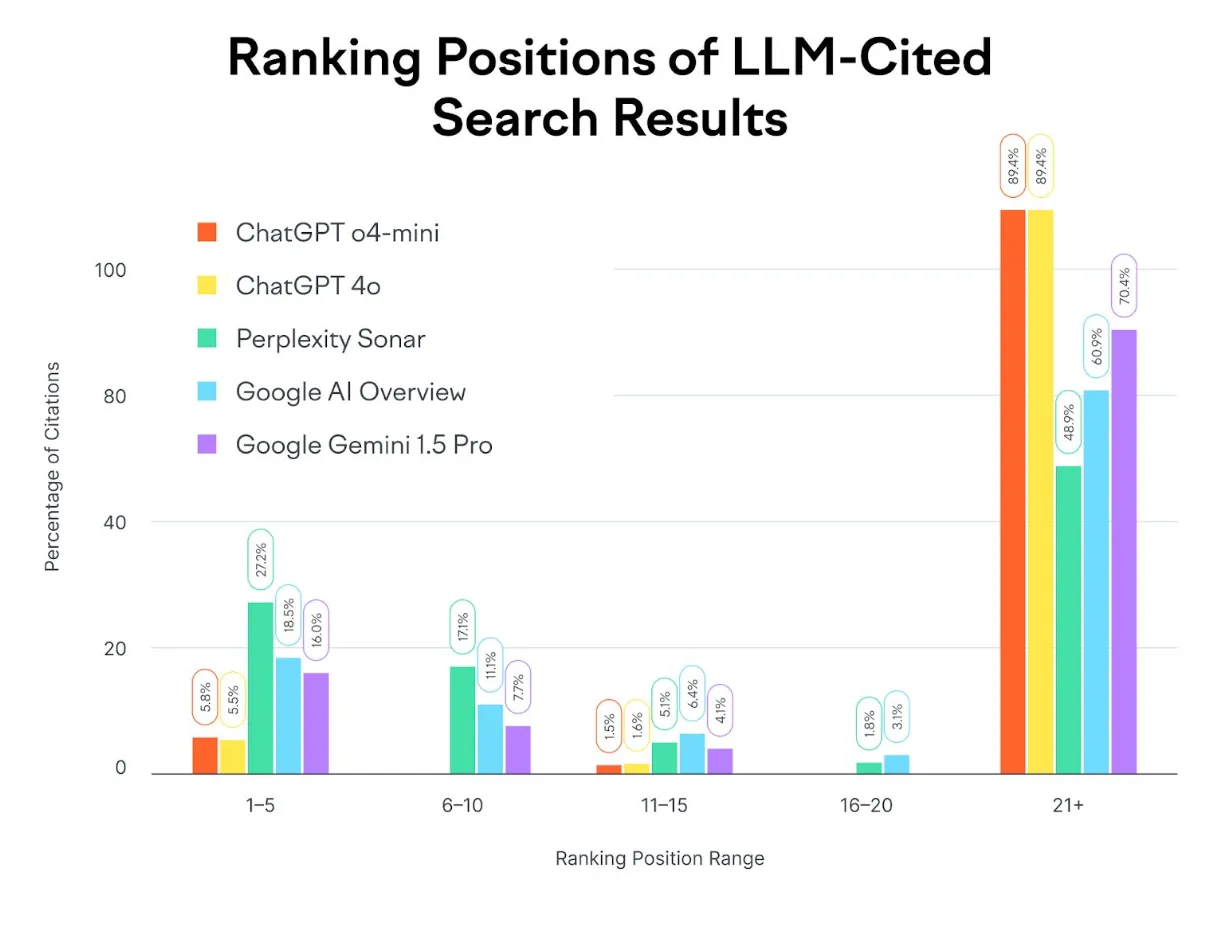
In other words: don’t abandon SEO fundamentals. Instead, think of them as the bedrock of your LLM SEO / GAIO / GEO strategy.
18. Create your own branded GPT on ChatGPT Marketplace.
OpenAI's GPTs Marketplace lets you publish a custom-branded GPT, complete with your own uploaded knowledge files - company docs, case studies, product FAQs and more. This provides the model with direct, guaranteed access to your content, bypassing the need for external crawling.

Canva gained a major advantage in AI visibility by launching its own custom GPT trained on deep, structured knowledge about the product, use cases, and design workflows. Instead of relying only on external mentions or SEO, Canva fed its proprietary content directly into ChatGPT, making the brand consistently present in design-related conversations.
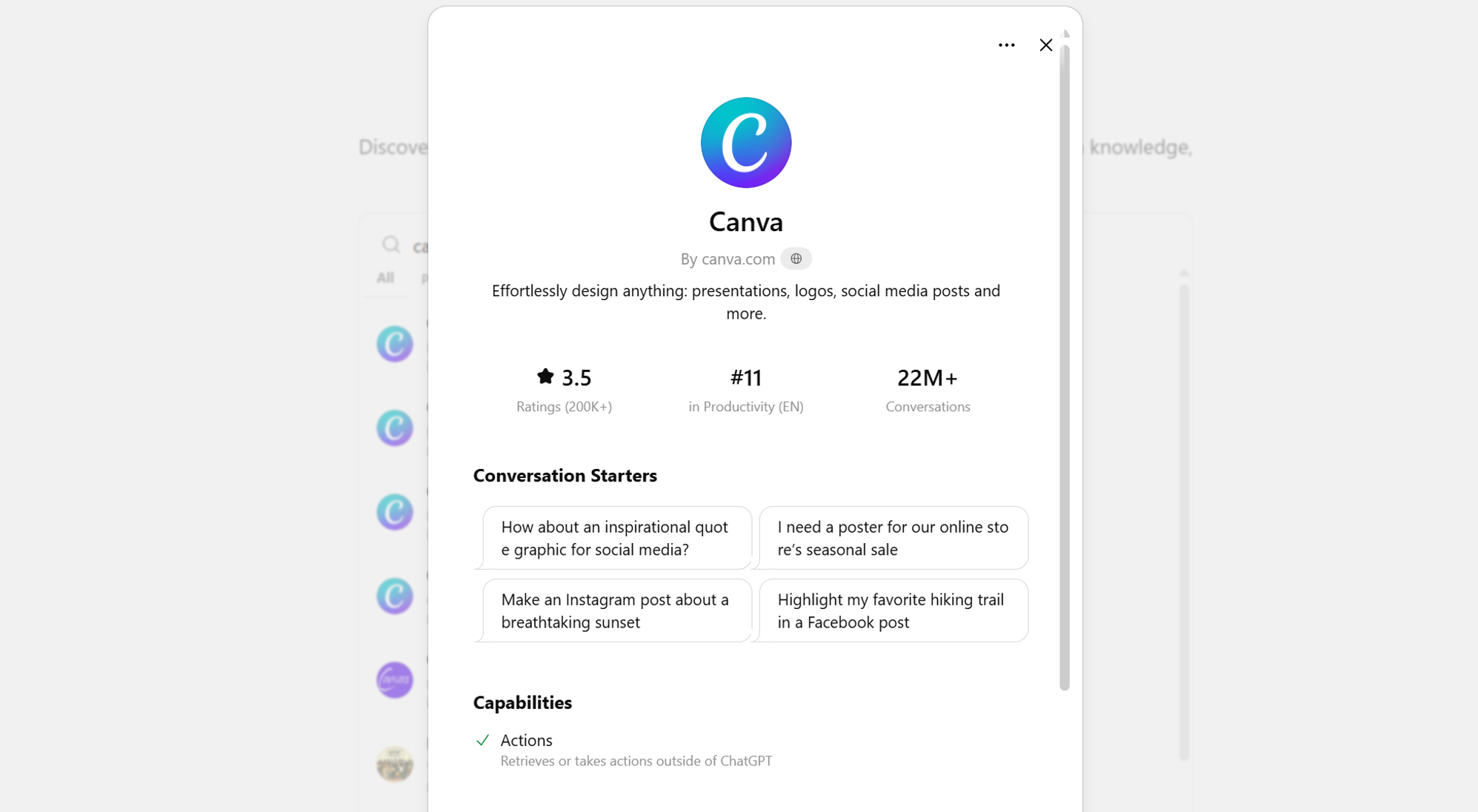
The custom GPT scaled to tens of millions of interactions, creating a compounding effect where Canva became the default reference point inside AI answers. This translated into a clear lead in AI-driven visibility and traffic, allowing Canva to pull away from competitors by being embedded directly in the AI interface rather than just cited as a source.
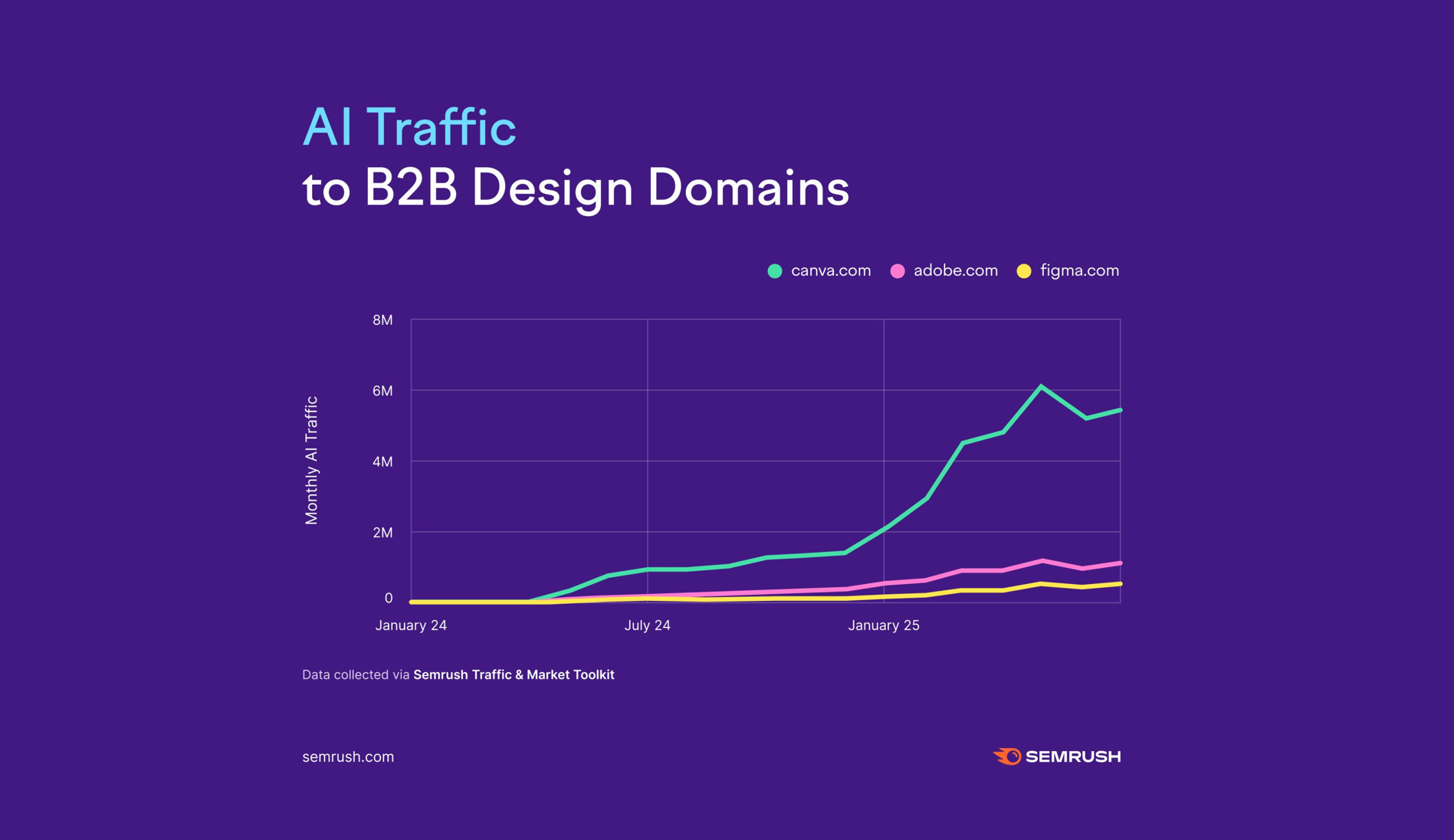
Summary
The way people discover brands is shifting - fast. Traditional SEO is losing ground to AI-driven answers from ChatGPT, Perplexity, Gemini, and others. To win visibility in this new landscape, brands must rethink their strategy.
If your content isn’t optimized for AI, it might as well not exist. It’s not about chasing rankings anymore - it’s about becoming reference-worthy in the AI-first web.
